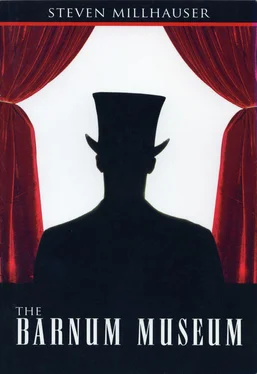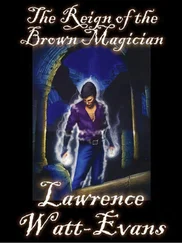Steven Millhauser
The Barnum Museum: Stories
To Charlotte Millhauser
and the memory of Milton Millhauser
The board.The board shows the ground plan of an English mansion. The nine rooms are displayed along the sides of the board and are connected by a floor consisting of a series of identical yellow squares the size of postage stamps. In the middle of the board, on a stairway marked with a white X , rests a black envelope. Each room bears its name in the center, in black capital letters: the STUDY, the HALL, the LOUNGE, the DINING ROOM, the KITCHEN, the BALLROOM, the CONSERVATORY, the BILLIARD ROOM, and the LIBRARY. Each room contains furniture, drawn in black outline and pictured from above, as if we are viewing the room from the center of its ceiling. One corner of the board is partly concealed by the edge of a saucer, on which lies a smoking cigarette.
The table.The board lies not quite in the center of a green folding table, which shines with a dull gleam in the glow of two lights: the overhead porch light, encased in four squares of frosted glass, and the small red-shaded lamp attached to one of the porch walls. Additional light comes through the four small panes of the kitchen-door window, part of which is covered by translucent yellow curtains. If we view the table from directly above, as if our vantage point were that of the moth beating its wings against the glass of the overhead light, we see that the green border of the table is crowded with objects: a coffee-stained saucer on which lies a smoking cigarette; four pads of Detective Notes; a green quarter-full bottle of wine, bearing on its label a purple sketch of a grape arbor with three purple birds flying overhead; two yellow hexagonal pencils, one round black pencil (supported by a hand), and one round shiny-green pencil; an opaque glass bowl, white on the inside and orange on the outside, containing a few broken three-ring pretzels lying among crumbs and pretzel salt; a nearly empty stem-glass of red wine, which bears on its cup, in white letters, the legend BROTHERHOOD: AMERICA’S OLDEST WINERY; two tulip-shaped glasses of red wine; a slender wineglass one-third full of 7-Up; a half-empty cup of coffee; a transparent green glass bowl of potato chips; and a small china plate showing, beneath a scattering of brown crumbs, a blue stone bridge overlooking a blue stream with three blue ducks, one of which is raising its head toward the outstretched blue arm of a girl in a blue bonnet. In the course of the game, while the tokens move on the board, these objects also move; some of them move small distances, whereas others, like the bowl of potato chips, the bowl of pretzels, and the bottle of wine, exchange places or move to different, unpredictable places on the table. In addition there are, at the moment of observation, three hands on the table: one hand taps restlessly between the saucer with the cigarette and the nearly empty glass of wine; the side of another hand, lightly tanned, lies quietly on the table while the pad of the forefinger moves slowly, slowly back and forth against the glistening tapered thumbnail; and a third hand, holding the round black pencil, writes a question mark beside the words Professor Plum on the Detective Notes and at once erases it.
Jacob.Jacob Ross, twenty-five, sits tapping the fingers of his right hand on the tabletop as he stares unseeing at the fan of five cards in his left hand: the LIBRARY, the KITCHEN, the BILLIARD ROOM, Professor Plum, Mrs. White. He is so angry that he feels it as a pounding in both temples and a beating in his throat. He is so angry that he would like to weep, to cry out, to kill, to sweep his long hand across the board and fling from the table the tokens, the weapons, the die, the black envelope, but when, by old habit, he imagines how he appears to whoever may be watching him, he sees only a look of tense concentration, an exaggerated and brooding attention to the cards in his hand. But he is angry. He is enraged. At Marian: for speaking to him in a certain tone of voice, in their father’s study four hours ago, immediately after dinner. At Susan: for their epic argument in the car that afternoon, lasting from 3:37 (by his watch) on the Mass Pike to 5:54 (by his watch) under the railway trestle by the Post Road, exactly two minutes and thirty-six seconds before he drew up in front of his parents’ house. At David: for saying nothing, for concealing his hurt, for flooding him with forgiveness. At himself: for spending eight hours a day (2:00–6:00 and 8:00–12:00) six days a week at his desk for the past four months unable to write a single new word of what was to have been Part One ( The Book of Childhood ) of the greatest American poem of the second half of the twentieth century, after a period of five months during which he had accumulated 180 pages of manuscript in a minuscule handwriting in a single spiral-bound notebook (Narrow Ruled). He is enraged at his failure, at his evasions, at his later and later awakenings, at the slow erosion of his belief in his destiny, at the inexplicable wreckage of his dream, at his inevitable future as an embittered professor of English at a major university, at the unknown obstacle, at his daily defeated will. Jacob taps his fingers against the tabletop, not metrically but in a nervous and disordered rhythm that exasperates him as if the hand belonged not to him but to some clumsy stranger inhabiting him and smothering his brain. “Colonel Mustard,” he says sharply, not looking up. “In the library. With the revolver.”
Pray forgive me.Colonel Mustard enters the LIBRARY and sees, standing with her back to him to the left of the fireplace, Miss Scarlet, in a tight crimson dress, reaching for a book in the bookcase. At the sound of the opening door she turns suddenly; the book drops to the floor. “Oh, I didn’t—” she says, crouching swiftly to pick up the book and with her other hand sweeping a lock of pale hair from her eye. “Pray forgive me for disturbing you,” the Colonel remarks, closing the door quietly behind him. Her crouching knees, one higher than the other, press through the clinging crimson, which seems stretched to the breaking point. It is an effect not lost on the Colonel, who feels, in his right palm, a sudden sensation of taut silk and tense thigh. Proper now, aren’t we. Ripe for it.
The library.Viewed from above, the LIBRARY is a symmetrical figure that may be thought of as a modified rectangle: from each of the four corners a small square is missing. The resulting figure has twelve sides. As in all the rooms, the furniture is pictured from above and drawn in black outline. Thus the lamp on the central table reveals only the hexagonal top of its shade, whereas the standing lamp beside the fireplace reveals the top and side of its shade, the slanting line of its stand, and the slender oval of a base we assume to be circular.
Marian.Marian Ross, twenty-four, rolls the red die, which tumbles past the DINING ROOM into the LOUNGE and comes to rest beside the lamp. Four. Marian is no longer angry at Jacob, who was not one, not two, not three, not four, but four and a half hours late on David’s fifteenth birthday; who’d been expected for lunch but who arrived, without a phone call, four minutes before dinner; who stepped from an unknown car in the unannounced company of some girlfriend or other; and who said something impatient and unsatisfactory about a broken alarm clock, while Miss Slenderella stood with a little frown and suddenly introduced herself with an outthrust hand and a tinkle of silver bracelet: hello, I’m Susan Newton. Marian moves her piece, Miss Scarlet — she always chooses Miss Scarlet — from the LIBRARY in the direction of the distant BALLROOM.
Читать дальше












